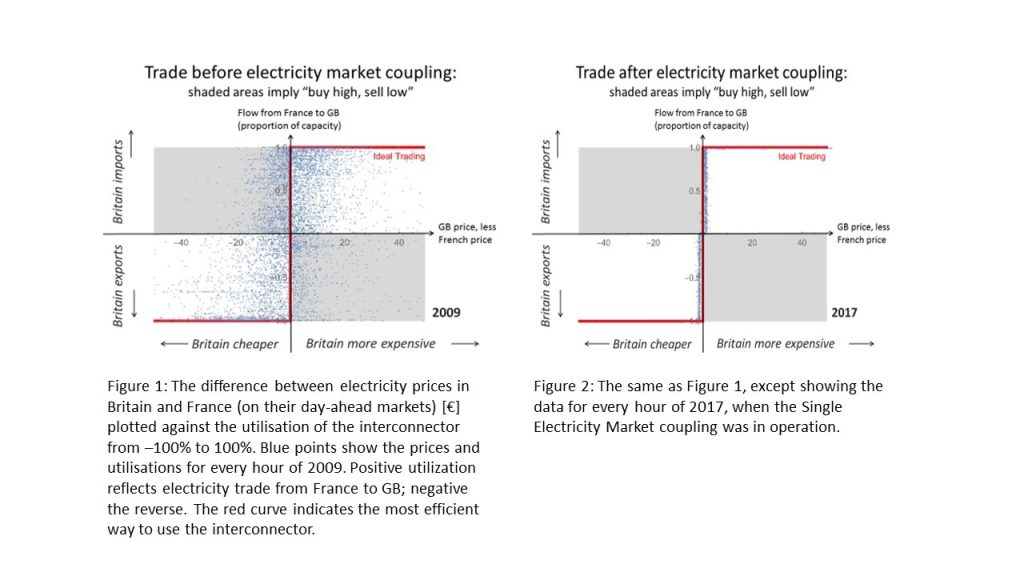
That’s according to new research undertaken by the UK Energy Research Centre [2], which comes ahead of the Commons vote on the Brexit deal on 11.12.18 and three months before the UK is due to leave the EU. If the UK crashes out of the EU without a deal or with ‘third country status’ as a consequence of Brexit [3], inefficient trading could increase electricity generation costs by £270 million a year.
The EU’s electricity market allows electricity to be traded across borders to neighbouring countries, maximising the benefits of an interconnected electricity system. By coupling the electricity markets of the 19 countries in North-Western Europe, it automatically trades electricity from lower- to higher-priced markets, maximising profits and energy security [4]. The EU plans to expand trading (interconnector) capacity to 10% of countries’ installed electricity production capacity by 2020 and 15% by 2030 [5].
Prior to the single electricity market, markets closed at different times, forcing traders to decide their cross-border trades based on anticipated, rather than actual prices. With traders guessing the price of electricity, errors were made, capacity went underused, and energy flowed the wrong way up to a third of the time. This can be seen in the noisy trading pattern of price differences and capacity utilization in Figure 1.
Coupled markets close at the same time, with trade undertaken on the basis of market prices, avoiding these errors. Market coupling eliminated this noise and power almost always flowed from the low- to the high-priced market (Figure 2, 2017). With Elecxit, Britain might return to the old system with large trading errors.
But these trading errors will occur in a world with more renewables (which are unpredictable) and more trading capacity, so both the frequency and size of errors could rise. Predicting electricity trading patterns in 2030 and comparing a “Soft Elecxit” with market coupling, and a “Hard Elecxit” where the British and French markets are decoupled, the cost of generation in the two countries increases by £500m or 1.5% of the market value. Great Britain carries 60% of these losses, equating to £270 million a year.
Professor Richard Green said: ‘EU rules prevent electricity traders from buying expensive electricity in France and selling it at a loss in Britain. With a no-deal Brexit, traders could take back control and make bigger mistakes than in the past.’
Dr Joachim Geske said: ‘Abandoning the successful system of electricity market coupling is not an inevitable result of Brexit. However, we wish to illustrate the costs of doing so, which are likely to grow significantly over time.’
Dr Iain Staffell said: ‘Britain leads the world in how it has decarbonised its power system, and recently passed the point of having more renewables installed than it does fossil-fuelled power stations. With ever more electricity coming from variable sources, having inefficient trade with our neighbours would cause real harm to consumer electricity bills, not to mention the security and stability of electricity supply.’

Power flows from France to Britain in the top half of each diagram, and the British price is greater than the French price on the right-hand side. Blue dots in the white panels (bottom left, top right) show times when power flows followed the sensible rule of “buy low, sell high”. Points that fall in the grey panels indicate trades which lost money, as power was bought expensive and sold cheap.
ENDS
Notes to editor
[1] The work referred to in this press release has been submitted to a journal and is awaiting acceptance, so at time of writing the research has not been peer reviewed. This peer review process often takes over a year in economics journals. ‘Elecxit: The Cost of Bilaterally Uncoupling British-EU Electricity Trade’ authored by Dr Joachim Geske, Professor Richard Green and Dr Iain Staffell of Imperial College London, was submitted 28.10.18. We are making these results available due to their relevance to the current debates about the EU withdrawal agreement and political declaration.
[2] The UK Energy Research Centre (UKERC) carries out world-class, interdisciplinary research into sustainable future energy systems. Our whole systems research informs UK policy development and research strategy. UKERC is funded by The Research Councils Energy programme. See http://www.ukerc.ac.uk/ for more information.
[3] The rejection of the European Court of Justice excludes British actors from the single electricity market, and in the ‘third country’ scenario in the case of no deal Brexit ‘EU rules in the field of energy market regulation will no longer apply to the United Kingdom’.
[4] EU-wide welfare gains through market coupling on the day ahead markets have been estimated as 0.2-0.5% of the market value, at a time when there was less uncertainty and interconnector capacities were lower.
[5] See: https://ec.europa.eu/energy/en/topics/infrastructure/projects-common-interest/electricity-interconnection-targets
For more information:
Jessica Bays, Head of Communications and Policy, UKERC, Tel: 07809 239 308
Email: j.bays@ukerc.ac.uk